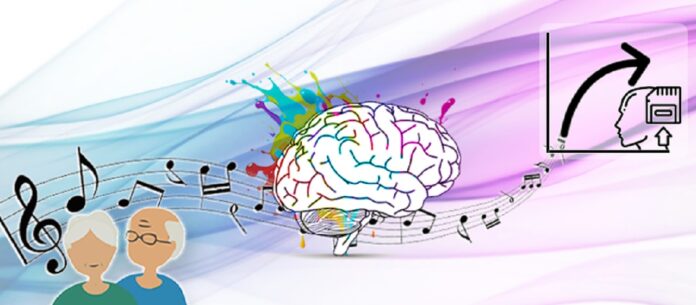The number and proportion of people over 60 years are growing rapidly, so efficient policies are necessary to foster healthy aging. Age is the strongest risk factor for dementia. However, healthy aging and optimal management of health risk factors can delay dementia onset. Healthy aging is a multifactorial process arising from biological decline, individual capacities, and physical/social environmental factors.
A team of researchers from the University of Geneva (UNIGE), HES-SO Geneva, and EPFL discovered that practicing and listening to music can slow cognitive decline in healthy seniors by increasing grey matter production.
A new study discovered that music practice and active listening could help to prevent the decline of working memory. Such activities boosted brain plasticity and were linked to an increase in grey matter volume. Positive effects on working memory have also been observed.
This study included 132 healthy retirees aged 62 to 78, and one of the requirements for participation was that they had not taken any music lessons in the previous six months.
The researchers followed over 100 retired people who had never practiced music before and were enrolled in piano and music awareness training for six months to achieve these results.
Our brain constantly remodels itself throughout our lives. Brain morphology and connections change in response to our environment and experiences, such as when we learn new skills or recover from a stroke. This “brain plasticity,” however, diminishes as we age. The brain also loses grey matter, which contains our valuable neurons. This is referred to as “brain atrophy.”
The cognitive decline appears gradually. Working memory, at the heart of many cognitive processes, is one of the most harmed cognitive functions. Working memory is the process by which we temporarily retain and manipulate information to achieve a goal, such as remembering a phone number long enough to write it down or translating a sentence from a foreign language.
Damien Marie, the first author of the study, a research associate at the CIBM Center for Biomedical Imaging, the Faculty of Medicine, and the Interfaculty Center for Affective Sciences (CISA) of UNIGE, as well as at the Geneva School of Health Sciences, said, “We wanted people whose brains did not yet show any traces of plasticity linked to musical learning. Indeed, even a brief learning experience during one’s life can leave imprints on the brain, which would have biased our results.”
The participants were randomly assigned to one of two groups. The second group received active listening lessons on instrument recognition and musical property analysis. The classes were one hour long. Participants in both groups were required to complete half an hour of homework per day.
Clara James, a privat-docent at the Faculty of Psychology and Educational Sciences of UNIGE and full professor at the Geneva School of Health Sciences, said, “After six months, we found common effects for both interventions. Neuroimaging revealed increased grey matter in four brain regions involved in high-level cognitive functioning in all participants, including cerebellum areas involved in working memory. Their performance increased by 6%, and this result was directly correlated to the plasticity of the cerebellum.”
The scientists also discovered that the amount of daily training, the number of lessons completed over the course of the intervention, and the quality of sleep all positively impacted the degree of performance improvement.
However, the researchers discovered a difference between the two groups. The volume of grey matter in the right primary auditory cortex a key region for sound processing – remained stable in the pianists but decreased in the active listening group.
Damien Marie said, “A global brain pattern of atrophy was present in all participants. Therefore, we cannot conclude that musical interventions rejuvenate the brain. They only prevent aging in specific regions.”
This result shows that practicing and listening to music increases brain plasticity and cognitive reserve. The study’s authors believe these fun and easy-to-implement interventions should be a major policy priority for healthy aging.
The team’s next step is to assess the potential benefits of these interventions in people with mild cognitive impairment, a stage between normal aging and dementia.
Journal Reference:
- Marie, D., Müller, etal. Music interventions in 132 healthy older adults enhance cerebellar grey matter and auditory working memory, despite general brain atrophy. Neuroimage: Reports. DOI: 10.1016/j.ynirp.2023.100166
